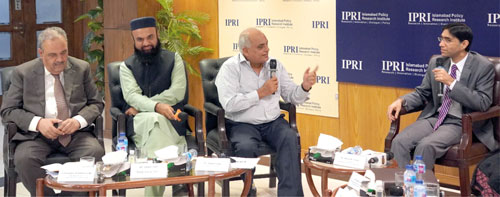An interactive session on ‘Economy, Governance, and Security, on 75 years of Pakistan’s Journey,’ was presided over by Dr Moeed Yusuf, former National Security Adviser and Patron-in-Chief of IPRI. The dialogue was attended by APTMA General Secretary Shahid Sattar; Dr Shabana Fayyaz of Quaid-e-Azam University; Dr Usman Chohan, Director CASS; Dr Sadia Zahoor, Policy Expert SPPC; Dr Abdul Jalil of PIDE and Ambassador Asif Durrani.
The speakers said that Pakistan has come a long way and now is the time to address the structural deficiencies by bailing out the country. Most of the thrust was on economy, as the considerate opinion was that until and unless local talent and resources are buoyed to usher in a new social contract, nothing much will change for good. Dr Moeed Yusuf was categorical that the youth must stand up and their talent be recognized for a new, prosperous and better Pakistan.
The speakers regretted that Pakistan’s manufacturing base, which was its pride in the initial years, was eroded due to lack of cohesive policies. This is why the country fell back on exports, and many of its industries that were its pride withered away. Likewise, the biggest problem is current account deficit, and the same has encroached over the economy owing to our expansive and unreal lifestyle, as well as over valuing of currency.
Focus was also laid on commercialization of education and how it has eaten into the vitals. Similarly, population explosion has hurt the country like none other factor and it has plunged the country into low per capita growth rates.
One of the best way to bounce back, it was observed, was to increase productivity. Shahid Sattar observed that even if we produce half of what East Punjab harvests in Punjab, our productivity we add three trillion rupees to the economy. He went on to add that there is no substitute to growth and exports, and this is where synergies should be addressed.
Issues in energy consumption and its uneven distribution was also highlighted, and observed that only 23 per cent of gas goes into production sector, whereas the rest is consumed in nonproductive arenas. Whereas, in other developing countries the ratio is more than 60 per cent.
It was stressed and noted that no government has taken the clarion call to take decision as are required for national interests and in public welfare, as they seem to be subdued at the hands of vested interests.
Ambassador Asif Durrani made a passionate explanation as to how recognizing Israel will help Pakistan’s national interests, and said that an overwhelming number of Muslim states had walked the path. He was of the view that Kashmir is a bilateral dispute between India and Pakistan, and correlating it with Palestine is illogical.
He also stressed for taking a pro-regional lookout so that we are no more dependent on allies. Citing the example of Iran, he said that it has 97% literacy rate, and it has one of the best primary healthcare systems in vogue. He said that Pakistan can go ahead with energy deal with Iran despite sanctions, if we can finance the entire pipeline project on our own.
The consolidated outcome of the interactive dialogue was that Pakistan should reduce the size of the government, specialists must be introduced in policy-making circles, as well as engage with the international community in a holistic manner by explaining the foreign policy projections of the country.
It was stressed to rewrite a new social contract, do away with the regime of licensing and regulations in an attempt to ease businesses and invest massively in the potential of youth. The participants underscored that dialogue at all fora is a must, and political stability is indispensable for growth and prosperity.










